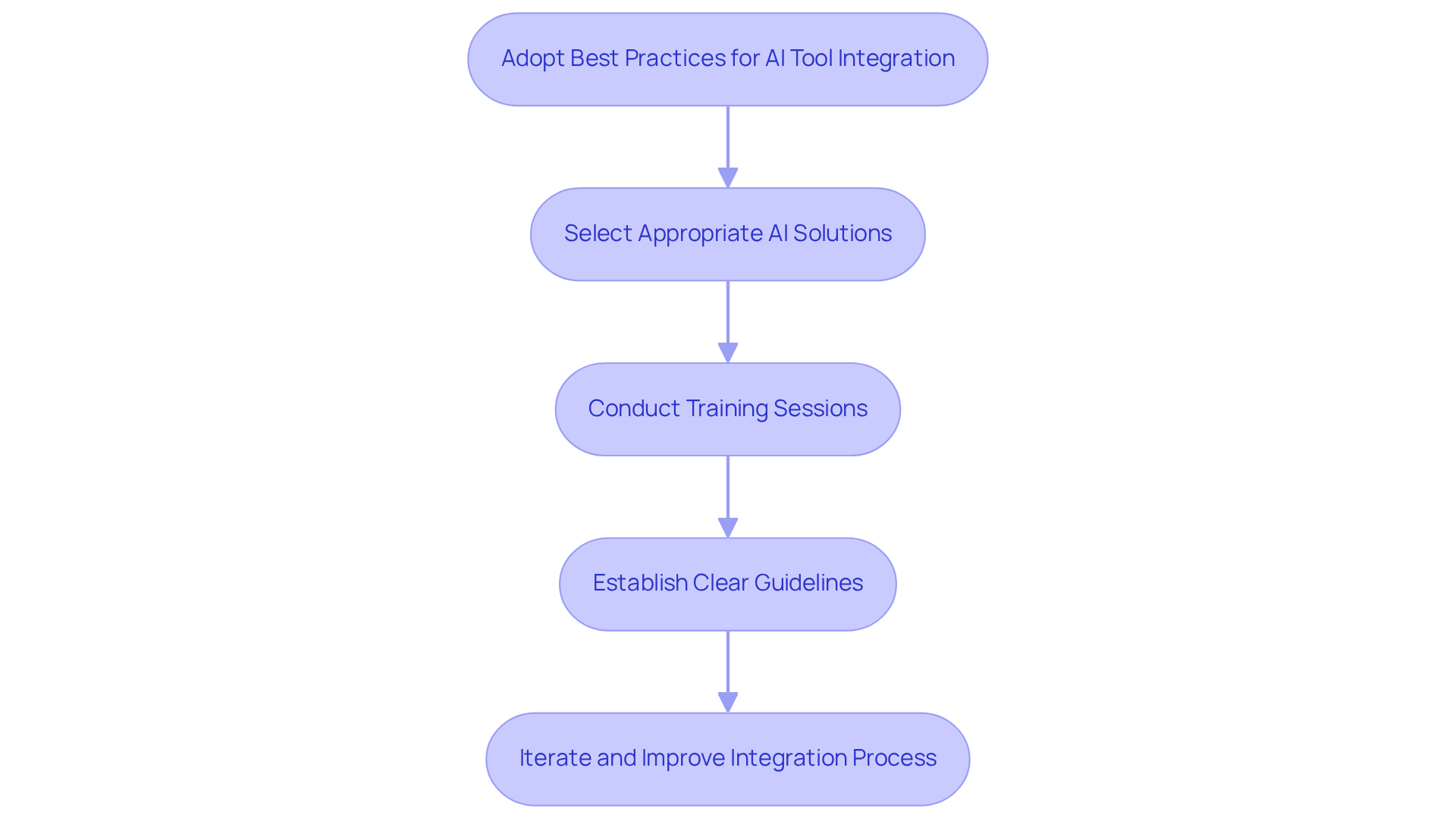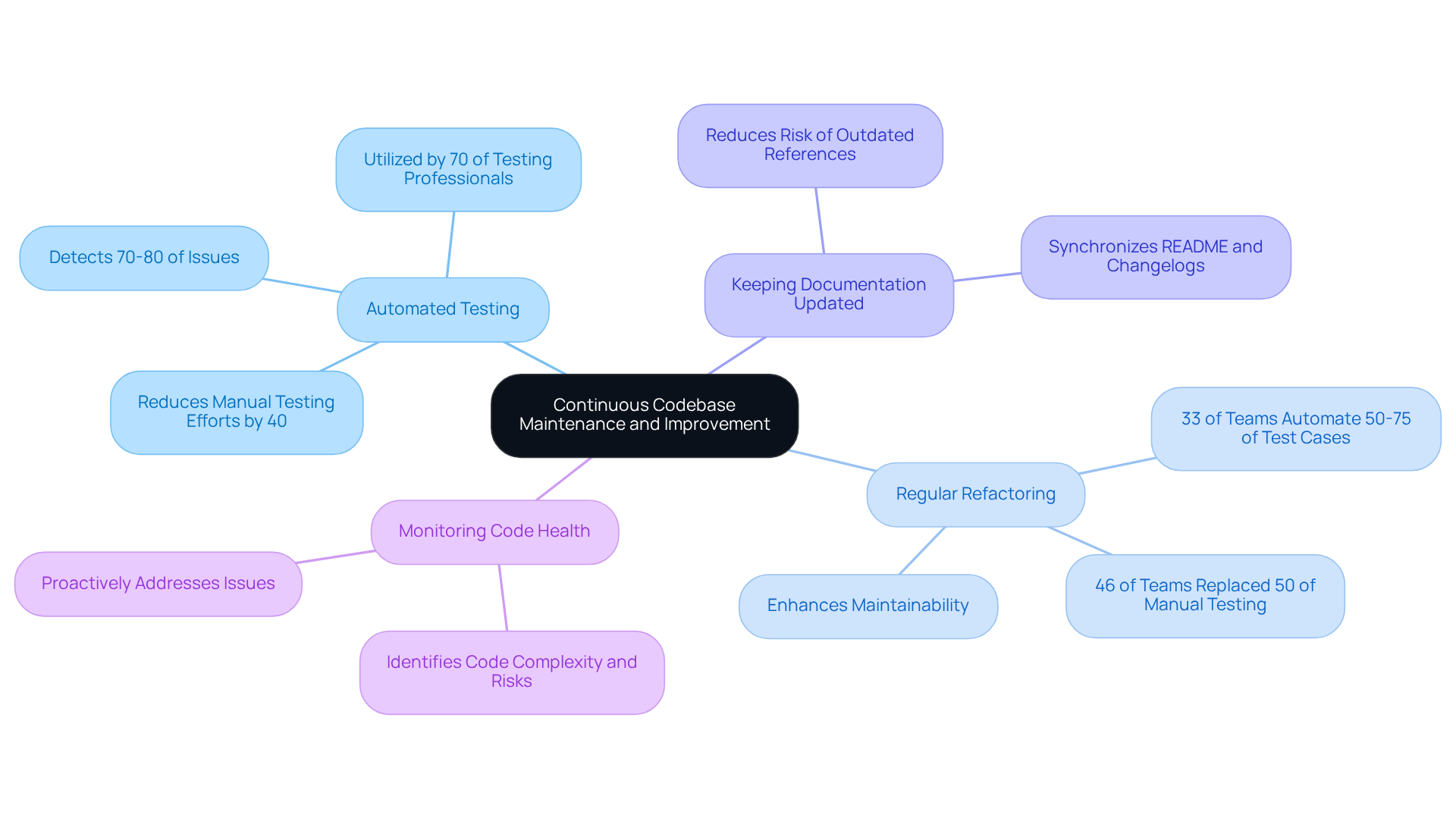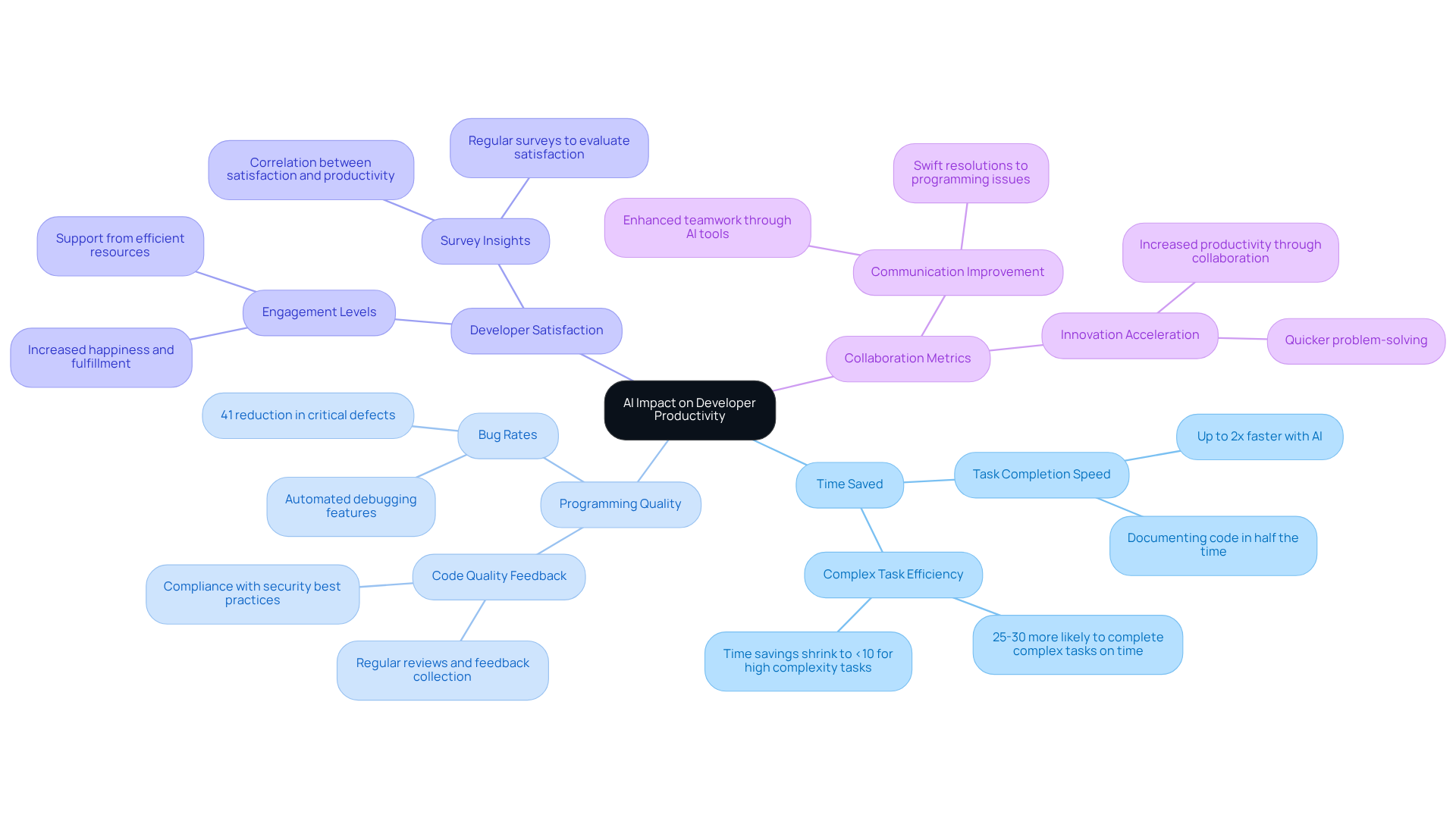Overview
Coding can be a challenging endeavor for developers, often fraught with obstacles that hinder productivity and code quality. However, Kodezi offers innovative solutions to these common problems, integrating AI tools designed to streamline coding workflows. With features such as automated debugging and regular code maintenance, Kodezi significantly enhances the coding experience.
By leveraging Kodezi, developers can witness marked improvements in both productivity and code quality. Imagine reducing errors and increasing efficiency simply by utilizing advanced AI capabilities. The integration of these tools not only simplifies the coding process but also empowers developers to focus on what truly matters—creating exceptional software.
Are you ready to elevate your coding practice? Explore the powerful tools available on the Kodezi platform and discover how they can transform your workflow. Experience firsthand the benefits of effective AI integration and take your coding to the next level.
Introduction
In the dynamic realm of software development, developers face increasing complexities and demands for higher efficiency. The integration of artificial intelligence is not just a trend—it's a transformative force reshaping coding workflows. Tools like Kodezi emerge as vital allies, automating tedious tasks and enhancing code quality.
How can teams effectively harness these AI capabilities while ensuring ethical practices and maintaining high standards? This article explores four strategic approaches to elevate AI coding workflows, offering insights that could redefine productivity in the tech landscape.
Understand the Role of AI in Coding Workflows
In the ever-evolving landscape of software development, coding challenges are a constant for developers. AI is transforming the AI coding workflow by automating repetitive tasks, enhancing quality, and providing real-time feedback. How can developers overcome these hurdles? Kodezi addresses these challenges with its innovative features, allowing developers to shift their attention to more intricate problems while AI handles repetitive coding tasks.
One standout capability is Kodezi's automated code debugging feature, which enables users to instantly identify and fix issues within their codebase. This feature not only provides detailed explanations of what went wrong but also insights into how it was resolved. Furthermore, this capability enhances performance optimization by fixing bottlenecks and ensuring adherence to the latest coding standards, while also supporting security compliance.
The benefits of using Kodezi are compelling. Recent statistics reveal that:
- 82% of developers currently employ AI resources for coding.
- 76% expect improved writing efficiency through these technologies.
- 81% of developers recognize enhanced productivity as the greatest advantage of AI resources.
This integration not only boosts productivity but also helps minimize errors and alleviate technical debt, enabling teams to uphold high standards in their codebases.
As industry leaders emphasize, the partnership between developers and the AI coding workflow is crucial for promoting innovation and ensuring long-term success in software development, particularly through resources like Kodezi. However, it is important to acknowledge that:
- 79% of developers have raised concerns about misinformation and disinformation in AI results, highlighting the need for ethical considerations in AI deployment.
- 70% of professional developers do not perceive AI as a threat to their jobs, indicating a positive outlook on the integration of AI in their work.
Are you ready to explore the tools available on the Kodezi platform? Discover how these features can transform your coding experience and enhance your productivity.
Adopt Best Practices for AI Tool Integration
To effectively integrate AI tools into the AI coding workflow, developers often face significant challenges. With the rapid evolution of technology, how can teams ensure they are utilizing the best resources available? Enter Kodezi, a powerful ally in navigating these complexities. By selecting the appropriate AI solutions, teams can enhance productivity and improve their AI coding workflow to address specific coding challenges. With 97% of developers already employing AI resources, the right choice becomes essential. Notably, AI adoption in software development is projected to rise by 53% each year, underscoring the growing importance of these tools. Kodezi's automated code debugging capability allows teams to promptly detect and resolve issues within their codebase, ensuring that selections made improve overall quality and performance while adhering to security compliance and coding standards.
Furthermore, preparing your group is crucial. Conducting extensive training sessions ensures that all members are skilled in utilizing AI resources effectively. As AI adoption in software development is expected to increase significantly, implementing an AI coding workflow will equip your team with essential skills and enhance their efficiency. CG Seetharaman, CTO at Softura, emphasizes that "AI is deeply transforming software development — it's essential, not optional." Familiarity with resources like Kodezi CLI can empower teams to auto-heal codebases swiftly within an AI coding workflow, thereby enhancing productivity and reducing the time spent on pull requests.
In addition, establishing clear guidelines is vital. Developing protocols that outline when and how to use AI tools in the AI coding workflow helps prevent over-reliance on automation and ensures that human oversight remains a priority. This is especially important considering that AI-generated programming can occasionally introduce errors. Studies indicate a 41% increase in bugs due to AI adoption, highlighting the necessity for careful monitoring. Kodezi's commitment to security compliance and coding standards can help mitigate these risks by ensuring adherence to best practices.
Similarly, iterating and improving the integration process is essential. Regularly assessing the adoption of AI tools and soliciting feedback from team members can identify areas for enhancement. Ongoing improvement in the AI coding workflow can lead to better outcomes, as organizations report a 27% decrease in overall development expenses through effective integration. For instance, ANZ Bank's trial with GitHub Copilot revealed a 42.36% reduction in task completion time, showcasing the tangible benefits of using AI tools. Kodezi's autonomous solutions for B2B engineering groups further illustrate how proactive codebase enhancements can prevent bugs before they reach production.
By adhering to these practices, teams can significantly enhance their programming efficiency while maintaining high standards of quality. The anticipated impact of these best practices includes increased productivity, reduced development costs, and improved code quality, positioning Kodezi's resources as a strategic advantage. However, it is important to consider the "vacuum hypothesis," which suggests that while AI expedites tasks, it may not eliminate labor-intensive work, necessitating a balanced approach to integration.

Ensure Continuous Codebase Maintenance and Improvement
Developers often face significant challenges in maintaining and improving their codebases. To tackle these issues effectively, teams should consider implementing several strategic practices.
-
Automated Testing is a crucial first step. By utilizing an AI coding workflow with tools like Kodezi CLI, teams can automatically detect and rectify issues, ensuring the software remains functional amid changes. Automated tests can identify 70-80% of problems during the testing phase, leading to a marked improvement in quality and a reduction in manual testing efforts by over 40%. Notably, more than 70% of testing professionals leverage automation to swiftly uncover bugs, further demonstrating its effectiveness.
-
Furthermore, establishing a routine for Regular Refactoring is essential. Regular code reviews and refactoring sessions help address code smells and elevate overall code quality. This practice not only enhances maintainability but also aligns with the growing trend where 33% of teams aim to automate 50-75% of their test cases as part of their AI coding workflow, showcasing a commitment to efficiency. Significantly, 46% of teams have replaced 50% or more of their manual testing with automation, highlighting the shift towards automated methodologies.
-
In addition, keeping Documentation Updated is vital. Consistently updating documentation alongside programming changes ensures that all team members have access to the latest information, reducing the risk of outdated references. Automated documentation software can synchronize README files, changelogs, and inline documentation, which is crucial for maintaining clarity and consistency across the codebase.
-
Lastly, teams should Monitor Code Health using tools that provide insights into code complexity and potential risk areas. By identifying entropy and risk zones, teams can proactively address issues before they escalate, ensuring a clean and efficient codebase that supports ongoing development efforts. The entropy detection feature of Kodezi is particularly beneficial in this regard, as it helps teams identify and mitigate risks effectively.
By adopting these practices, teams can significantly enhance the robustness and flexibility of their codebases, ultimately fostering a more effective development environment. Are you ready to explore the tools available on the Kodezi platform to elevate your coding practices?

Measure and Optimize AI Impact on Developer Productivity
In the fast-paced world of software development, coding challenges can significantly hinder productivity. To address these issues, teams can leverage AI tools like Kodezi, which offer innovative solutions to streamline the AI coding workflow and enhance efficiency. By focusing on key metrics, developers can effectively measure and optimize the impact of AI on their productivity.
Time Saved: It's crucial to monitor the duration required to complete tasks before and after incorporating AI resources like Kodezi. This quantification of productivity gains can reveal significant improvements, with studies indicating that developers can complete tasks up to two times faster using generative AI. Furthermore, developers utilizing these tools were over twice as likely to report increased happiness and fulfillment, adding a qualitative aspect to productivity gains.
Programming Quality: Assessing the quality of software generated with AI support involves monitoring bug rates and collecting feedback from reviews. Kodezi's automated debugging feature enables teams to promptly identify and rectify codebase issues, providing thorough explanations of what occurred and how it was addressed. This ensures compliance with the latest security best practices and programming standards. Research shows that organizations employing generative AI report a 41% reduction in critical defects, and 31% of highly effective software teams have experienced productivity increases of over 60% through AI adoption, highlighting the potential for enhanced code quality.
Developer Satisfaction: Regular surveys can evaluate developer contentment with AI resources, as enhanced satisfaction often correlates with greater productivity levels. Developers who feel supported by efficient resources like Kodezi are more engaged in their work. Notably, those utilizing generative AI-driven resources were 25 to 30 percent more likely to accomplish intricate tasks within the specified time frame, directly connecting satisfaction to productivity outcomes.
Collaboration Metrics: Examining collaboration patterns can reveal whether AI resources improve communication and teamwork among developers. Kodezi's capabilities enhance collaboration by providing swift resolutions to programming questions and issues, resulting in quicker problem-solving and innovation, ultimately increasing productivity.
By concentrating on these metrics, teams can make informed, data-driven decisions to optimize their AI coding workflow with tools like Kodezi, ultimately enhancing overall productivity and code quality. However, it is also important to acknowledge potential challenges in AI adoption, such as the learning curve when integrating the AI coding workflow into software development. Are you ready to explore the tools available on the Kodezi platform and elevate your coding experience?

Conclusion
Embracing AI in coding workflows signifies a transformative shift in software development. Developers can now concentrate on complex challenges, as automated tools manage repetitive tasks. By integrating AI resources such as Kodezi, teams can significantly enhance productivity, optimize code quality, and uphold high standards, ultimately creating a more efficient development environment.
The article presents several key strategies for maximizing the benefits of AI in coding. These include:
- Understanding AI's role
- Adopting best practices for tool integration
- Ensuring continuous codebase maintenance
- Measuring AI's impact on productivity
With statistics showing a marked increase in AI adoption among developers, leveraging these tools is essential. From automated debugging to regular refactoring and documentation, each practice bolsters a robust coding workflow that minimizes errors and enhances overall performance.
As the software development landscape evolves, integrating AI tools paves the way for greater efficiency and innovation. Teams are encouraged to explore the capabilities of platforms like Kodezi and actively engage in adopting best practices. This proactive approach not only improves coding workflows but also positions teams for long-term success in an increasingly competitive field. The future of coding lies in the harmonious collaboration between developers and AI, paving the way for a more productive and fulfilling work experience.
Frequently Asked Questions
How is AI transforming coding workflows in software development?
AI is transforming coding workflows by automating repetitive tasks, enhancing code quality, and providing real-time feedback, allowing developers to focus on more complex problems.
What is Kodezi and how does it help developers?
Kodezi is a platform that addresses coding challenges by offering innovative features such as automated code debugging, enabling developers to identify and fix issues quickly while optimizing performance and ensuring coding standards and security compliance.
What are the benefits of using Kodezi?
The benefits of using Kodezi include improved productivity, minimized errors, reduced technical debt, and the ability to maintain high standards in codebases.
What statistics highlight the impact of AI on developers?
Recent statistics show that 82% of developers use AI resources for coding, 76% expect improved writing efficiency, and 81% recognize enhanced productivity as the greatest advantage of AI resources.
What concerns do developers have regarding AI in coding?
79% of developers have expressed concerns about misinformation and disinformation in AI results, emphasizing the need for ethical considerations in AI deployment.
Do developers view AI as a threat to their jobs?
No, 70% of professional developers do not perceive AI as a threat to their jobs, indicating a positive outlook on the integration of AI in their work.




